Jonathan Edwards: Sermons and Discourses (6 vols.)
Digital Logos Edition
Overview
Despite his fame as a preacher, many of Jonathan Edwards’ sermons and public addresses have gone unstudied and underappreciated. The volumes in this collection contain sermons and addresses that Edwards delivered between the years 1720-1758. Addressing a wide range of topics and to a range of audiences these offer fascinating insights into Edwards’ thought.
Many of these have been published for the first time in this collection. With this set you will gain insights into Edwards’ ministry that very few have ever had the chance to make!
Product Details
- Title: Sermons and Discourses
- Author: Jonathan Edwards
- Publisher: Yale University Press
- Volumes: 6
- Pages: 3,955
- Christian Group: Reformed
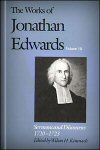
This volume presents the complete texts of twenty-three sermons preached by Jonathan Edwards during the first years of his career. The sermons, which have never been printed before, document one of the least explored periods of this eminent theologian's life and thought. Fully annotated, they are accompanied by an editor's preface that combines new information with fresh readings of related texts, such as the "Diary" and "Personal Narrative."
The volume includes a general introduction that puts Edwards' thirty-five years of writing and preaching into a broad literary and historical context. Based on the study of his entire sermon corpus—including over seventy printed sermons and twelve hundred sermon manuscripts—as well as related notebooks, letters, and treatises, the introduction enables readers to understand the elaborate network of working papers through which Edwards evolved his thought, as well as the critical function of the sermon in testing and developing expression of that thought. The introduction also explores the literary context of Edwards' writing, especially relating to the theory and practice of homiletics.
The sermons . . . are models of unobtrusive, intelligent editing. . . . That this edition is scrupulous and thorough testifies to Kimnach's quarter century of devoted scholarship; that it is graceful and generous only enhances his already considerable achievement.
—M. X. Lesser, The New England Quarterly
Wilson H. Kimnach is Emeritus Presidential Professor in the Humanities at the University of Bridgeport. He has been associated with the editorial committee of The Works of Jonathan Edwards, based at Yale University, for more than twenty years.
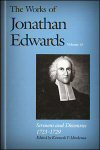
This book presents previously unpublished manuscript sermons from a crucial yet little-known period in Edwards' life: the years between the completion of his Master's degree at Yale College and the death of Solomon Stoddard, his famous grandfather and predecessor at Northampton, Massachusetts. These sermons, constituting the second in a projected series of six sermon volumes, highlight the intellectual and professional development of the young Edwards through his pastorate at Bolton, Connecticut, his Yale tutorship, and his colleagueship at Northampton.
In his introduction, Kenneth P. Minkema weaves together the details of Edwards' emerging career with the concerns expressed in the sermons. He shows how Edwards addressed local and provincial concerns as well as the great theological debates of his day, and how he struggled to work out the implications of his innovative concept of "excellency" and to develop his definition of conversion as a "spiritual light."
From these sermons emerges an unparalleled portrait of a rapidly maturing Edwards seeking to give shape to his theological vision.
The collection is essential for students of Edwards and his times.
—Gordon S. Wakefield, Theological Book Review
Each sermon in the volume proceeds from a mind and pen of extraordinary lucidity, force, and intelligence. . . . It will be the forthcoming sermon volumes in the Works that will give readers the mature and authoritative Edwards who establishes himself as a renowned and confident pastor, revivalist, and theologian. The encouraging news for scholars and students of Edwards is that work on [his] next four volumes is moving ahead full speed.
—Helen Westra, Calvin Theological Journal
The sermons in this volume are skillfully edited and annotated by Kenneth P. Minkema, the executive director of The Works of Jonathan Edwards. Dr. Minkema's unsurpassed facility with Edwards' manuscripts is clearly displayed in each of these texts.
—Ava Chamberlain, Church History
This is a series of rich meditations, preceded by an illuminating introduction to the whole set plus prefaces to each sermon. Recommended for all scholarly collections.
—Religious Studies Review
Kenneth P. Minkema is Executive Editor of The Works of Jonathan Edwards.
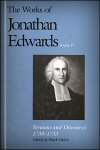
In his new role as pastor of the Northampton church, Jonathan Edwards turned his attention to the political, social, and economic activities of his congregation, shaping his preaching to the day-to-day occurrences in their lives. This volume contains eighteen sermons that Edwards composed in Northampton from the beginning of 1730 through mid-September 1733—such classics as God Glorified in Man’s Dependence and A Divine and Supernatural Light, along with many previously unpublished works. The selections illuminate Edwards’ development as a preacher and theologian. They also provide unique insights into the development of the themes that came to characterize his mature evangelical thinking: the viciousness of the unregenerate life, the importance of evangelical humiliation as a religious exercise, and the necessity of a radical conversion from worldliness to godliness.
The prolific period encompassed by this volume, though outwardly quiet, was crucial to Edwards’ maturation. Taking on the responsibilities of his calling—working with his congregation, finding his voice as a town religious leader, exercising moral and spiritual guidance, consulting with other pastors, and most of all developing a mature preaching style—Edwards came to see revival as the only solution to the social and moral ills of his time.
"This volume will help solidify an emerging new view of Edwards as a theologian with feet in both Enlightenment and awakening, scanning both church and society for signs of redemption. Valeri’s sermon titles are delightful . . . and his introductions insightful.
—Gerald R. McDermott, Religious Studies Review
Valeri has introduced each sermon by outlining its content, and by linking it to its historical setting and Edwards’ other writings. He has also provided a detailed general index and a biblical reference index. I highly recommend this volume to Edwardsean scholars, collectors, and to all librarians. For those interested in reading puritan, evangelical sermons, Edwards is one of the last but also one of the best of that genre.
—Barry Howson, ARC Journal of Faculty of Religious Studies, McGill
Mark Valeri is Ernest Trice Thompson Professor of Church History at Union Theological Seminary in Virginia.
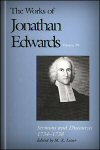
Jonathan Edwards achieved the greatest sustained mastery of the sermon form between January 1734 and December 1738—a time in which he also kindled his first revival. The Northampton revival spread to neighboring towns and villages, as did Edwards’ renown. And the sermons of these years exhibit not only splendid rhetoric but also figural intricacies and tonal nuances that reveal his maturity as a writer.
During this period Edwards delivered probably four hundred sermons and lectures. Of the fewer than half that survive, some extend the reach of the previous dozen years of his ministry, others engage speculative theological issues, others touch on pastoral life, and still others deal with conversion and, in time, declension. Edwards also wrote a full account of the Northampton revival, A Faithful Narrative of the Surprising Work of God, which was published in 1737 in London and Edinburgh and within a year was reprinted there, issued in Boston in three printings, and translated into German. In addition, near the end of the period Edwards put together Discourses on Various Important Subjects, five sermons about the Awakening and the only gathering of sermons he saw through the press.
M. X. Lesser is Emeritus Professor of English at Northeastern University.
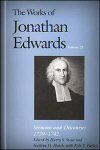
The sermons and discourses in this volume chart the rise and decline of the Great Awakening in Jonathan Edwards’ parish in Northampton, Massachusetts, and beyond. A leading figure of the revival period, Edwards delivered potent and wide-ranging sermons during the years 1739–42. In this volume the transcript of the original manuscript of Sinners in the Hands of an Angry God is reproduced for the first time, along with the text of its first printed edition.
Seeking to nourish the emerging revival spirit, Edwards preached on the glory of saints in heaven, the dangers and opportunities of the unregenerate on earth, and the torment of the damned and devils in hell. As the revival progressed he became ever more critical of participants' behavior, and with its decline he attempted—without success—to compel godliness.
This volume’s introduction is one of the best short guides to Edwards’ view of history. With dramatic and vivid prose that is reminiscent of the best of Perry Miller, Stout sketches Edwards’ substitution of history for theology as queen of the sciences, recasting systematic theology in the form of a history of redemption. Recommended for all libraries.
—Gerald R. McDermott, Religious Studies Review
Harry S. Stout is Jonathan Edwards Professor of American Christianity at Yale University and General Editor of The Works of Jonathan Edwards.
Nathan O. Hatch is President of Wake Forest University.
Kyle P. Farley is Dean of Jonathan Edwards College, Yale University.
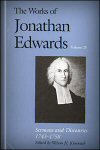
This wide-ranging volume covers the final fifteen of the thirty-three years that Jonathan Edwards preached and includes some of his greatest sermons—including his "Farewell Sermons" to his Northampton congregation. The period is defined by Edwards' inventive strategies to improvise during the delivery of his sermons. Considering dependence on the written text in the pulpit to be a serious failing, he devised a double-columned, outlined format for his sermon manuscripts and continued to use it for the rest of his life. Sermons from this period also include those preached to Mohican and Mohawk Indians at the mission post of Stockbridge, Massachusetts.
Edwards’ various writings of 1743–58 map the complex terrain of his spiritual, intellectual, and professional life after the Great Awakening. He deals with topics ranging from the spiritual role of youth in the community to the struggles over communion in his Northampton congregation to the war with the French and their Indian allies.
Wilson H. Kimnach is the general editor of the Jonathan Edwards sermon series in The Works of Jonathan Edwards and coeditor of The Sermons of Jonathan Edwards: A Reader. He is Presidential Professor in the Humanities at the University of Bridgeport and lives in Woodbridge, CT.
About Jonathan Edwards
Jonathan Edwards was born in 1703 in East Windsor, Connecticut to Timothy and Esther Edwards. He began his formal education at Yale College in 1716, where he encountered the Calvinism that had influenced his own Puritan upbringing. In 1727, he was ordained as minister of the church in Northampton, Massachusetts. The First Great Awakening began in Edwards’ church three years later, which prompted Edwards to study conversion and revival within the context of Calvinism. During the revival, Edwards preached his most famous sermon, “Sinners in the Hands of an Angry God,” and penned many of his most popular works, including The Distinguishing Marks of a Work of the Spirit of God, A Treatise Concerning Religious Affections, and The Life of David Brainerd. When the revival subsided, the church of Northampton became increasingly suspect of Edwards’ strict requirements for participation in the sacraments. Edwards left Northampton in 1750 to become a minister at a missions church in Stockbridge, Massachusetts. In 1757, Edwards reluctantly became president of the College of New Jersey (Princeton University), where he hoped to complete two major works—one that expanded his treatise on the history of redemption, and the other on the harmony of the Old and New Testaments. His writing ambitions were interrupted by his death in 1758, when he died of complications stemming from a smallpox inoculation.